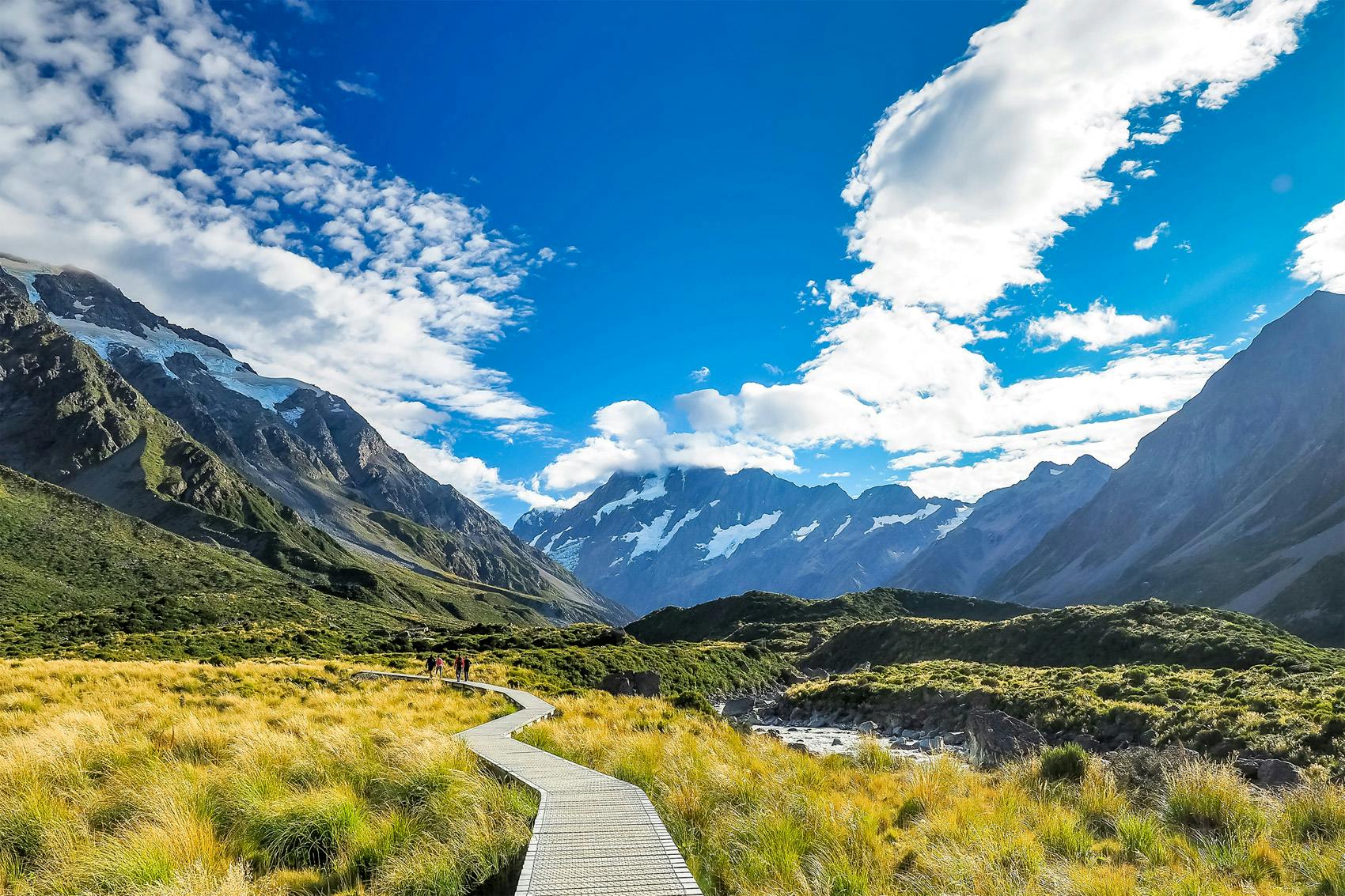Work in New Zealand
With its high quality of life, laid-back culture, reasonable cost of living and a range of job opportunities, graduates will find that New Zealand provides the perfect work/life balance
The Kiwis know a thing or two about living life to the full. They work hard and relax often, using their free time to enjoy all that their spectacular country has to offer.
With well over 200,000 British citizens living in New Zealand, the country ranks highly as an expat destination, and it's not hard to see why.
A number of job sectors are expanding - including construction, healthcare, and the professional, scientific and technical services industry - and the New Zealand government are looking to attract workers from other countries to fill the skills gap, meaning there are good job prospects for international workers.
The country also enjoys a temperate climate, uncrowded communities and a low crime rate. Popular destinations include Auckland, Waikato and Wellington on the North Island, and Canterbury and Otago on the South Island.
No matter where you decide to settle, there's plenty to see and do - from exploring mountain trails and national parks to enjoying the sights and attractions of metropolitan cities and beach towns.
Jobs in New Zealand
If you have the right skills and experience, it's always a good time to look for work in New Zealand.
There are currently plenty of job openings in industries such as business services, engineering, IT, retail and medicine - however, there are also opportunities to contribute more general skills.
Small and medium-sized enterprises (SMEs) account for a huge number of New Zealand businesses, while even the country's larger businesses are considered small by international standards.
Higher education institutions and the following organisations are all popular graduate employers:
- Air New Zealand
- ANZ Bank New Zealand
- Fonterra
- IBM
- Te Whatu Ora (Health New Zealand)
- Xero.
Because of competition for jobs, it's not uncommon for international job hunters to accept more junior positions in order to gain experience of working in New Zealand.
Don't limit your options by ruling out contract or part-time work - as this can sometimes lead to permanent employment.
Search for jobs in New Zealand at:
Popular graduate jobs
- Construction
- Engineering
- Financial services
- Healthcare
- IT
Skills shortages
Certain skills are in short supply and to help combat this, fast-track residency pathways are listed at Immigration New Zealand - Skill shortage list checker.
Occupations on the Green List of highly skilled roles at Tier 1 (Straight to Residence Visa pathway) include:
- aerospace engineer
- ambulance paramedic
- building project manager
- cardiologist
- careers counsellor
- civil engineer
- dairy farm manager
- database administrator
- environmental research scientist
- ICT project manager
- internal auditor
- midwife
- multimedia specialist
- naval architect
- physiotherapist
- quantity surveyor
- registered nurse (medical practice)
- secondary school teacher
- software tester
- veterinarian.

How to get a job in New Zealand
You'll need to look for and secure a job before being granted a visa and moving to the country. Applications are typically made online with a CV and cover letter. CVs in New Zealand differ in the sense that they rarely list all past jobs, instead they explain the skills you have and provide examples of how you've used them.
If your application passes the first stage, you may be offered a telephone interview. Face-to-face interviews tend to be informal and may be led by up to four people. Make sure you've thoroughly researched the position and the company before your interview.
A number of jobs aren't formally advertised, so making connections, networking and applying speculatively can prove useful.
Summer jobs
Every year, thousands of workers are needed to help harvest the country's fruit crops. Thanks to the budding tourist trade, you can also find employment in bars, restaurants, cafes, hotels, and at campsites and holiday parks.
During the winter season you may also be able to find opportunities at ski resorts.
If you have some childcare experience, you could find work as an au pair.
You can begin your search to find seasonal work at SEEK - Summer jobs.
If you want to give your CV a boost, there are a large number of voluntary agencies located throughout New Zealand. You can search for opportunities by type and location at Volunteering New Zealand.
For gap year and working holiday opportunities, you can sort these out through an operator such as Letz Live or Go Overseas.
Teaching jobs
There's always tough competition for teaching positions in New Zealand, with most teachers coming from countries such as England, Canada and America. Teachers of science, technology and mathematics are in high demand at both primary and secondary level. Supply teachers are also highly sought-after.
Gaining a position is dependent on your previous teaching experience and qualifications. To check your eligibility and to discover how to apply to teach in the country, visit the Teaching Council of New Zealand website.
To teach English as a foreign language (TEFL), you will usually require a Bachelors degree, plus a TEFL certificate. English is widely spoken, but you may still find opportunities in private language schools.
Upon arrival in New Zealand, teachers must register with the Teaching Council for your qualifications to be assessed by the New Zealand Qualifications Authority (NZQA).
Popular places in New Zealand for those who want to teach include:
- Auckland
- Christchurch
- Queenstown
- Wellington.
Internships
Work placements and internships have a number of advantages. They can help you to develop your skills and experience and provide you with relevant contacts, who may be in a position to help you get a permanent job.
Good places to start searching for work experience in the country include:
- BUNAC - Intern and work combo NZ
- The Intern Group - Internships in New Zealand
- Intern NZ
- Internship New Zealand
- New Zealand Internships
Speaking to companies directly is also a proven way of finding non-advertised opportunities.
New Zealand visas
There are several types of visa available if you want to live and work in New Zealand, either permanently or temporarily, and these are explained in more depth at Immigration New Zealand - Explore visa options.
To summarise, if you're from an accepted country, such as the UK, are aged between 18 and 35 and want to work on a temporary basis, you can apply for the Working Holiday Visa. The visa lasts for 12, 23 or 36 months, depending on which one you apply for.
To be eligible to work, the primary purpose of your trip must be to work for up to 36 months, or engage in training or study for up to six months. The visa costs 420 New Zealand Dollars (NZD), which works out at £202.
Other options include the:
- Accredited Employer Work Visa - opt for this visa if you possess the necessary qualifications and experience for a particular role and have been offered a full-time job. It's valid for up to five years and costs NZD750 (£361).
- Skilled Migrant Category Resident Visa - for those who have the skills, qualifications and experience to meet a New Zealand employer's need and are looking for a permanent long-term position (indefinite stay in the country). Once you have a job offer from an accredited employer, you can submit an expression of interest (EOI). The visa costs from NZD4,290 (£2,067).
- Work to Residence Visa - if you're currently working for, or have a job offer from, an accredited employer, and have worked in a Tier 2 Green List in-demand job for two years then you may qualify for this visa. You need to be aged 55 or younger to apply and the visa costs from NZD4,290 (£2,067).
- Straight to Residence Visa - this visa is for those who are working for, or who have a job offer from, an accredited employer on Tier 1 of the Green List in-demand roles. The visa costs from NZD4,290 (£2,067).
When considering applicants, Immigration New Zealand uses a points system. You get points for age, experience, employability and qualifications.
If you're not from the UK, contact the New Zealand embassy in your country of residence for more information on visas and work permits.

Language requirements
New Zealand's three official languages are English, Maori and New Zealand Sign Language.
Most business is done in English, and most organisations require competency in spoken and written English.
How to explain your qualifications to employers
Employers usually understand UK qualifications as the New Zealand education system is based on England's framework, but you'll need to clarify that this is the case before submitting your application.
Trade certificates, diplomas, Bachelor degrees and postgraduate qualifications are all acknowledged.
What it's like to work in New Zealand
The average working hours in New Zealand are typically between 35 and 40 hours a week across five days, with 40 hours being the maximum allowed.
The minimum wage for adults aged 16 years or over is currently set at NZD23.15 (April 2024), which converts to around £11.15 per hour.
Holiday entitlement is generous by international standards. Workers are entitled to at least four weeks' annual leave and New Zealand has 11 public holidays. If you work on a public holiday your employer must pay you extra. Public holidays include:
- New Year's Day
- Day after New Year's Day
- Waitangi Day
- Good Friday
- Easter Monday
- Anzac Day
- King's Birthday
- Matariki
- Labour Day
- Christmas Day
- Boxing Day.
Income tax and Goods and Services Tax (GST) is how New Zealand fund services for the benefit of all residents, and your salary in New Zealand is subject to income tax, whether you're considered a resident or are simply in the country on a temporary basis.
Personal income tax is calculated as below (from 1 April 2021):
- 39% for income over NZD180,000
- 33% on income from NZD70,001 to NZD180,000
- 30% on income from NZD48,001 to NZD70,000
- 17.5% on income from NZD14,001 to NZD48,000
- 10.5% on income up to NZD14,000.
To get more information on taxes for workers in New Zealand visit the New Zealand Inland Revenue.
According to Numbeo, the standard of living in New Zealand is very high, while the cost of living is moderate, being slightly higher than the UK, although rent is considerably lower.
Find out more
- Discover what it's like to study in New Zealand.
- Get the lowdown on living in the country at Live and Work New Zealand.

